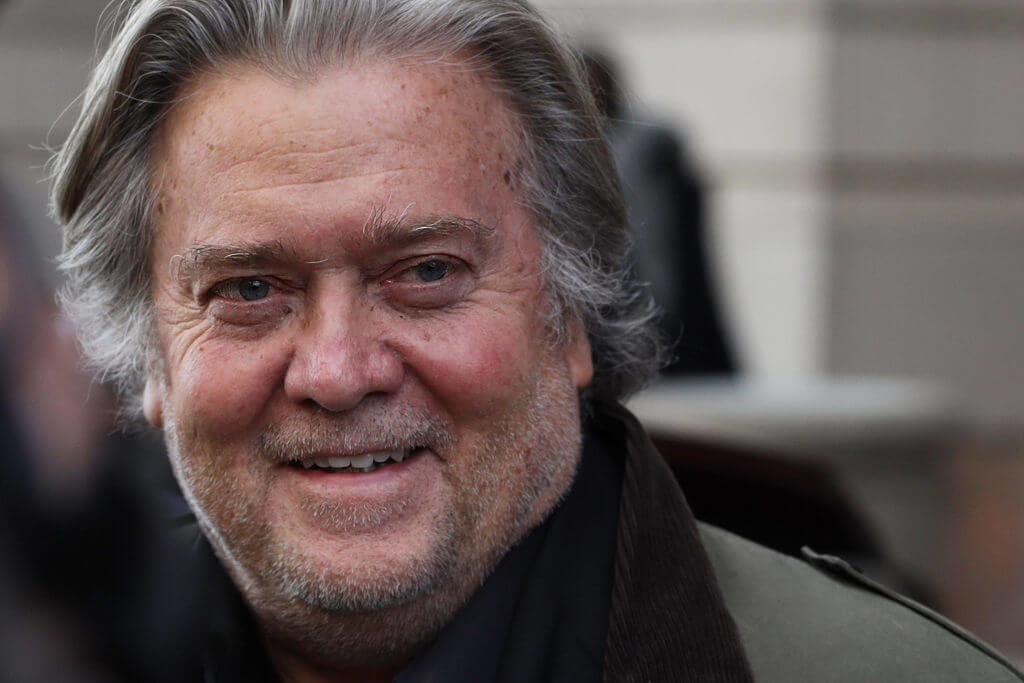Ahead of the signing of a phase one trade deal between the United States and China, former White House adviser Steve Bannon said U.S. President Donald Trump’s tariff strategy has handed him a huge win in the ongoing trade war.
Bannon, in an interview on CNBC, said that Trump “stood up for the tariffs and he broke the Chinese Communist Party.” Bannon, who used to run the far-right news outlet Breitbart News, has long been a critic of China.
“It’s only phase one, but directionally this thing is powerful,” Bannon said.
The deal tries to tackle some of the biggest issues Washington has with Chinese practices including intellectual property theft and forced technology transfers. It also calls for China to increase it’s purchase of U.S. goods, including $40 billion in farm goods, to $200 billion over two years, which was a major priority for Trump.
The U.S. also dropped plans of new tariffs on $160 billion in Chinese imports while also cutting tariffs on $110 billion in half to 7.5%.
Here’s a look at some of the deal’s core agreements, per CNBC:
- It calls for China to submit an “Action Plan to strengthen intellectual property protection” within 30 days of the agreement taking effect, according to the trade pact. The proposal would include “measures that China will take to implement its obligations” and “the date by which each measure will go into effect.”
- The deal says companies should be able to operate “without any force or pressure from the other Party to transfer their technology to persons of the other Party.” Technology transfers “must be based on market terms that are voluntary and reflect mutual agreement,” it reads.
- The agreement says China will increase purchases of U.S. manufacturing, energy and agricultural goods and services by at least $200 billion over two years.
- It makes commitments to try to root out the sale of counterfeit goods.
- The deal includes provisions to boost Chinese market access to financial services firms.
- Ahead of the signing, the Trump administration also revoked its decision to label China a currency manipulator.
Read the full deal here.
“We gave up very little in the end,” Bannon said.
Hayman Capital Management founder Kyle Bass appeared alongside Bannon in the CNBC interview, and he sees the phase one trade deal as more of a “temporary truce,” of which the U.S. was the ultimate winner.
“I know it’s billed as we’re looking at bringing the sides together, but China gave into a lot,” Bass said.
While China may have been the loser according to the two noted China hawks above, there is still a long way to go in the never-ending trade war that is now over 19 months long.
Treasury Secretary Steven Mnuchin hinted that “phase two” of the trade deal will most likely contain more tariff rollbacks, but it could come in multiple stages, and there’s no telling when negotiations of phase two will actually begin.
“Just as in this deal there were certain rollbacks, in phase two there will be additional rollbacks,” Mnuchin told CNBC Wednesday prior to the deal signing. “It’s really just a question of, and we’ve said before, phase two may be 2A, 2B, 2C. We’ll see.”
Mnuchin thinks the biggest component of the phase one deal is enforcement, which is a major bump in the road for any lasting trade deal between the world’s two largest economies.
“The first step is really focusing on enforcement, but this gives China a big incentive to get back to the table and agree to the additional issues that are still unresolved,” Mnuchin said.
